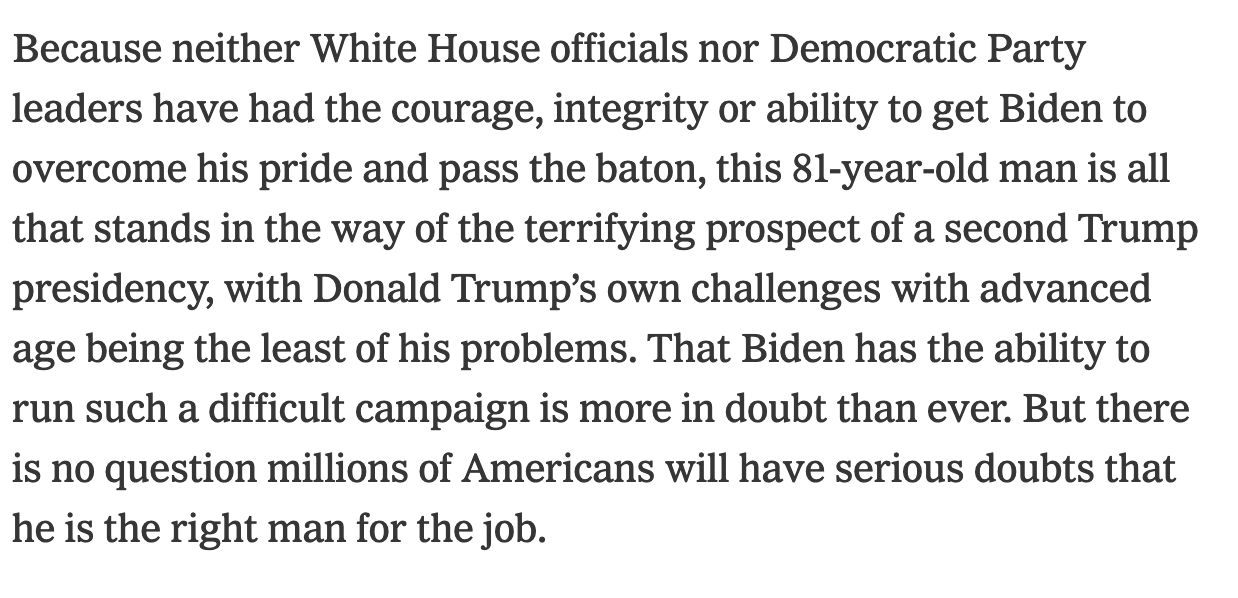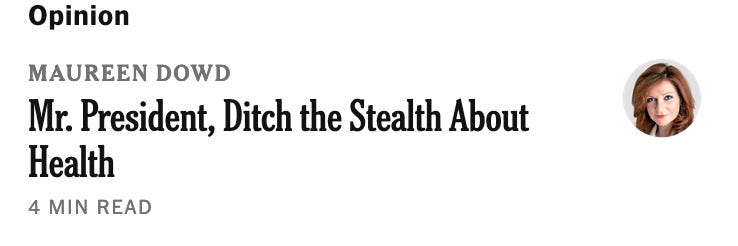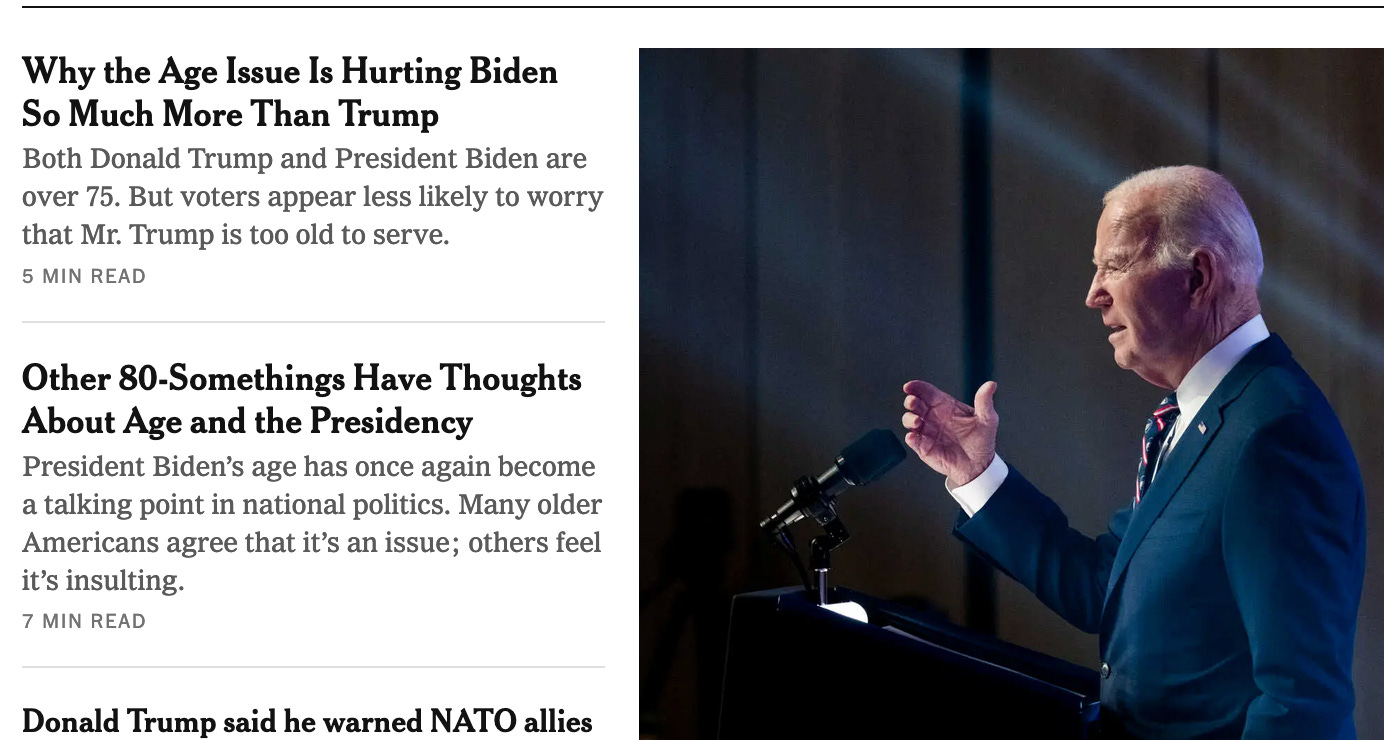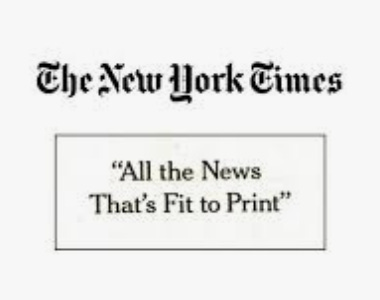THE NEW YORK TIMES IS FAILING AMERICA, WHY ARE WE LETTING IT HAPPEN?
Who Appointed the Times, "Newspaper of Record"?
Some questions based on a perhaps unwarranted assumption: that nearly everyone who finds their way to First Rough Draft of History substack—either as a subscriber or through the happenstance that is still part of the internet experience—reads the New York Times.
When did you start reading the paper? Do you think of it as “the newspaper of record”?
Here’s my answer to the first question: I was seven and my father, who looked at the sports pages first, showed me how to read a box score. Reading the sports page first is a habit I had until a year ago when the Times acquired the online ‘zine The Athletic, then fired its in-house sports department, and demanded I pay extra to read about sports in its new acquisition.
And this is my answer to the second: Yes, I still regard it as the newspaper of record … and I wish that it wasn’t.
I also wish that it was possible to bestow that institutional heft elsewhere. Because the Times is failing. This past week came a personal breaking point. The cause was special counsel Robert Hur’s report on President Biden’s mishandling of classified documents. His report exonerated Biden of wrongdoing and then focused on the man’s mental acuity … at some length.
In addition to blanket news coverage the paper’s response included an instant reaction by Nick Fox of the editorial board criticizing Biden and the entire Democratic party establishment of dereliction in not forcing Biden to step aside:
The news cycle is often no more than an hour these days but since the NY Times is a market-maker of that news cycle it can keep a topic alive. The next day came this debate:
Well, I guess there are two sides to every question. The Times ethos is all about airing both sides in opinion pages and covering all sides in the news. But the paper wasn’t done. Today it keeps the story alive on the opinion pages and the news pages
Look at the last line in this screen grab, the one about Trump warning NATO allies that they are on their own if they don’t pay up their dues. In a speech in South Carolina yesterday (Saturday, Feb 10) he told this anecdote:
If there has been one political story this past week worthy of blanket coverage it is that Trump, who lost to Biden by 7 million votes, and his MAGA lackeys in the House of Representatives and Senate are running an alternative foreign policy and doing so rather successfully.
Ukraine funding is delayed. A solution to the situation on the border was voted down by MAGA (let’s stop calling it the Republican Party) because, as has been widely reported, Trump wants the issue to fester until Election Day so he can run claiming he’s the only one who can fix it.
The chaos on Capitol Hill, the crippling of Ukraine funding, the sustaining of a divisive issue like immigration can only give aid and comfort to America’s enemies, in particular Vladimir Putin. Giving aid and comfort to the enemy is called treason.
The treasonable activities of the presumptive presidential nominee of the Republican Party might be worth more coverage than Biden’s age has received. But not in the newspaper of record, whose motto remains:
Why do people continue to grant the Times its status as the paper of record?
At one level the answer is: because it really is the biggest and most comprehensive news outlet in the country. There is no other news organization regardless of its origin—print, broadcast or online—that does what the Times does every single day: provide an encyclopedic, multi-media snapshot of the previous day’s events in all areas of life, along with entertaining interactive features AND recipes for dinner.
No other newspaper has as many subscribers, currently 10.36 million. (660,000 in print, 9.7 million online) That’s roughly three times as many as the Wall Street Journal and four times as many as the Washington Post, it’s two main rivals for the title.
The Times to its credit takes the idea of being the newspaper of record seriously. It’s online archiving, available to all subscribers, is comprehensive and an absolutely essential research tool for journalists, academics, and students.
It is not just the public that gives the Times this deference. Its news competitors do as well. The editorial processes of virtually every outlet are shaped by what the NYT deems to be important. In my time as NPR’s London correspondent, covering the peace process in Northern Ireland, I frequently got flaming emails from the foreign editor saying, this is today’s NYTimes why don’t you have it? Often, I already had had it or I was actually on the ground in Belfast while the NY Times correspondent was in London and had filed some unfiltered government spin. No matter, if it was in the Times that was what counted.
You get used to the special status governments accord the Times correspondent. A few months after Tony Blair won his landslide victory in 1997 he was invited to the White House and all the bureau chiefs of American news outlets were invited to Downing Street for an on the record briefing with the new Prime Minister in advance of the trip. We sat around the cabinet table with Blair and asked our questions. When the meeting was over the Times correspondent (and the Washington Post bureau chief) stayed behind and were given one to one time. You accept this privileged access with an existential shrug even when your editor sends you an email the next day demanding to know why the Times has this quote, why didn’t you get this quote?!
It probably isn’t healthy for a news outlet to carry this much clout in a society. And the situation has only got worse in recent years as competitors have become hollowed out or disappeared altogether. Competition is what makes for good journalism. The NPR editor who harangued me relentlessly actually spent the bulk of his career at the Washington Post when the Post was a genuine competitor with the Times. That is no longer the case and it has exacerbated the arrogance of the paper to the detriment of its reporting.
The Times necessarily is a lightning rod for criticism from fellow journalists and more than a bit of envy as well as the general public that reads the paper or, more likely in this day and age, sees a snippet of a Times article taken out of context and used as a cudgel to beat up the reporter who wrote the piece as well as the whole institution.
I think it does effect the people who work there. I’ve known a number of Times folk and have become friendly with a few but generally speaking most of those I have encountered are tetchy, difficult people, unsuited temperamentally for association with an essential public institution. I sometimes think that the human resources department administers psychological tests to prospective employees and the ones deemed least able to handle envy and public criticism were the ones who got hired.
Pressure well beyond the ordinary forces of daily deadlines shapes the working environment. Many years ago, during the time when Abe Rosenthal was editor, I had a brief relationship with a psychotherapist who saw a number of Times people in her practice. Without naming names she described a workplace overstocked with ambitious folks who had been first in class all their lives through elite universities and suddenly were in an environment where they were just grunt troops in an army of similarly overeducated, overpraised people. Ambitions thwarted, they did not know what to do. No one quits the NY Times. Their frustrations were turned in on themselves and on their families and so they needed professional counseling to help them.
I should say, in the interest of full journalistic disclosure, that I have contributed a number of book reviews and op-ed pieces over the years. (the last one is here). But my ability to crack the acknowledged “most valuable piece of real estate” in journalism was entirely down to who happened to be an editor at the time. Like the military, the Times rotates people from post to post and like the military there is very little the soldier/journalist can do about it.
The Times, like so many of the main institutions of liberal (in the non-political sense) life in America, is too imperfect an institution to be granted automatically its status as “paper of record”. No one voted for it to have this title, the processes which have changed journalism over the last forty years did not originate with the paper. It has been better than its competitors in re-shaping its product to fit the internet, multi-media, social media age. Its greatest success in recent years has been this business success.
But on the journalism front its internal, neurotic arrogance and its self-evidently poor recruitment policies have led to blunders in certain areas of coverage, particularly American politics and society. The obsession with Biden’s age rather than the treasonous nature of the MAGA congress is just the latest example.
What can be done, before November, to snap the Times out of this funk? That is more a rhetorical question than anything else but since I asked here are two modest, improbable proposals:
In this election year let’s get one more race on the ballot, a vote for which news outlet should be called “newspaper of record.” Failing that perhaps Times subscribers should withhold their subs until we are given a voice in the paper’s editorial direction. An intervention is called for.
If you agree contact me and let’s get a campaign going.
On a completely different subject: a new FRDH, First Rough Draft of History podcast, is now available. It’s a fast and furious conversation with Brian Klaas.










If subscribers can mount such an action great! I keep hoping thousands will turn out in DC and many state capitols to defend democracy and call MAGA out...just as Germans are doing now in their daily/weekly demos against right wing extremism aka the Alternative for Deutschland. We are in deep political trouble in the US and while this trouble did not begin with djt ( much of the current day issues of gridlock and the goal of one party rule began during Nixon's tenure, the ALEC to name one...need more history, watch 13th and read their website) he and the "movement" around him are a clear and present danger to the US and the free world. The russian tyrant and his partners express their glee. And sadly, Garland, who may have even a decent Justice, seems like a deer caught in the headlights. Yes. The NYT has outsized influence. Some of their opinion writers must live pissed off, otherwise there might be a little more grace and humility. We live in times made coarse, brutish, and inhumane. The orange cheato and his crowd of grievance holders have turned over all the rocks releasing a lot of suppressed rage. The danger of djt cannot be ignored. But worse is the absolute silence regarding his think tank army of Federalist Society, Heritage Society, ALEC, Grover Norquist, etc. There are too many to name here.
I’m in.